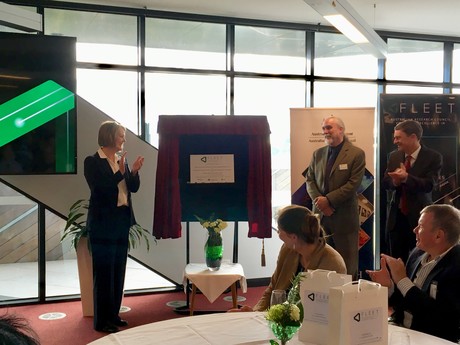ARC centre to tackle the hidden energy costs of computing

With the global appetite for computing currently burning more than 5% of global electricity — a figure which is expected to double each decade — a new Australian Research Council Centre of Excellence is seeking new solutions to an ever-growing problem.
Opened yesterday at Monash University, the ARC Centre of Excellence in Future Low-Energy Electronics Technologies (FLEET) is a collaboration of more than 100 researchers at seven Australian universities and 13 Australian and international science organisations. The $33.4 million centre will use the emerging science of topological materials and atomically thin 2D materials to create ultralow-energy electronics that achieve zero, or near-zero, wasted dissipation of energy.
For the past 50 years, our ever increasing need for more computing was satisfied by improvements in computing technology, which produced ever smaller, ever more efficient chips — a phenomenon known as ‘Moore’s law’. However, as we hit limits of basic physics and economy, Moore’s law is winding down.
“When we exhaust further efficiencies in silicon technology and data-centre management, energy will become the limiting factor for any further computation growth,” said Professor Michael Fuhrer, director of the newly opened FLEET.

Already, information and communications technology is responsible for 5–8% of global electricity use, with most of that energy consumption ‘hidden’ out of sight in vast, factory-sized data centres (or server farms). In fact, each smartphone is now responsible for burning more electricity than a household fridge. Continuing the IT revolution means finding a new electronics technology that uses much less energy.
“FLEET places Australia at the forefront of exciting new scientific research — building capacity for advanced electronics research and training today’s workforce for the electronics industry of the future,” said Professor Fuhrer.
The centre of excellence was opened by ARC Chief Executive Officer Professor Sue Thomas with Monash Provost and Senior Vice President Professor Marc Parlange and Professor Fuhrer. Participating universities include Monash University, the University of New South Wales, the Australian National University, RMIT University, Swinburne University of Technology, The University of Queensland and the University of Wollongong.
Rockwell has released its 2025 sustainability report
Rockwell Automation has published its 2025 Sustainability Report, which shows how the company is...
Bürkert team to take on sustainability strategies
The fluidics experts at Bürkert have assembled a global, interdisciplinary team that...
ASC certifies NT barramundi farm
Aquaculture Stewardship Council has announced that Humpty Doo Barramundi, based in the Northern...








